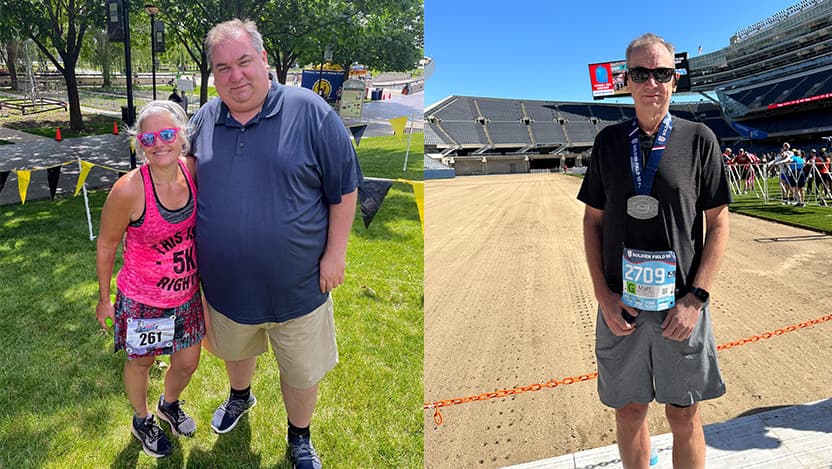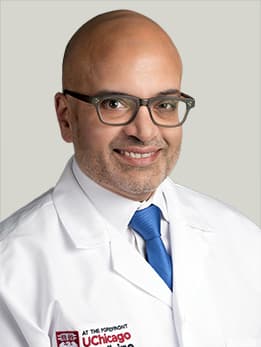‘It has transformed my life’: How duodenal switch surgery helped a Chicago man go from size 5X to M

Matt Wingard felt stuck in a cycle.
He tried special diet programs, exercise, and participated in a weight-loss study at a leading Chicago hospital. Bariatric surgery was on his radar, but his insurance company at the time refused to cover the surgery despite its potentially life-altering benefits.
The Chicago resident's attempts to manage his weight didn't last. The pounds crept back on and the number on the scale inched upwards.
By January 2021, Wingard, 52, weighed 425 pounds. His weight-related medical issues, including prediabetes and high blood pressure, led his insurance company to finally approve duodenal switch (DS) surgery at the University of Chicago Medicine, an internationally respected leader in this surgery.
Vivek N. Prachand, MD, an expert in minimally-invasive abdominal surgery, used incisions less than a half-inch long to reduce the size of Wingard's stomach by about 80%. He also bypassed a segment of the patient's small intestine.
These procedures significantly decreased Wingard's appetite and helped him feel full after small portions. It also reduced digestion and absorption of food and liquid. Like all DS patients, Wingard must take daily vitamin supplements for the rest of his life.
Duodenal switch surgeries are among the most effective bariatric surgeries available, with a 90% success rate
Though DS surgeries make up just 2% of weight-loss operations in the United States — many of which are performed at UChicago Medicine — they are among the most effective bariatric surgeries available, with a 90% success rate.
Pre-DS surgery, a psychologist on the UChicago Medicine Bariatric Surgery team determines whether each patient has the support they need and is ready to make necessary changes in their lifestyle and their relationship with food.
Wingard's first evaluation resulted in disappointment.
"We talked about my habits and really kind of got into my relationship with food and how I felt about it," Wingard said. "I was very honest, which you're supposed to be, and the psychiatrist was, like, 'I'm sorry, I don't think you're ready for the surgery.'"
Wingard's speech slows slightly when he thinks back to that day. His insurance had finally approved the procedure, and here he was being told "no." He was crushed.
Yet the psychological preparation for any bariatric surgery is critical.
"Part of this is making sure a person is emotionally and mentally ready to undergo significant change," Prachand explained. “Additionally, making sure that patients who may have mental health issues are receiving the treatment they need before surgery is an important part of helping our patients achieve the best results possible.”
Wingard was disappointed, but not resigned. He started meeting weekly with a psychologist and learned how to get back on track with his diet after making bad food choices, rather than continuing to overeat for the day.
"At the time, it was frustrating, because I knew I was working toward a goal and I wanted to get it done," Wingard said. "But looking back, it was an awakening, almost."
When the psychiatrist re-evaluated him in July 2021, Wingard was ready for surgery.
Typical candidates for DS surgery have a body mass index greater than 50 (more than 150 pounds overweight). Despite losing 25 pounds, Wingard's BMI was 53.
Matt lost 250 pounds and went from a size 5X to a medium — the same size worn by his 25-year-old son.
The type of surgery recommended is individualized for each patient and takes into account both the desired amount of weight loss and medical conditions related to obesity (such as diabetes, high blood pressure and acid reflux), which can improve and even go into remission after surgery.
Prachand says the surgery went well. Because of a congenital abnormality in Wingard's small intestine identified during surgery, the surgeon performed a slight variation called a loop (or SADI-S or SIPS) DS, which avoided more complex surgery involving the small intestine.
As for the results, they were immediate. Wingard went from being a self-described "guy who could crush a whole pizza" to being unable to finish two ice cube-sized squares of pureed chicken.
It took time to adapt to his new body. At first, the downtown resident regretted no longer enjoying food, a common, transitory reaction patients may experience, Prachand said. The Chicago man also avoided the few outings taking place during the pandemic that revolved around eating.
"I didn't want to be that guy, 'Oh, Matt can't go there, there or there," said Wingard, now 55. "Even once I moved past the pureed stage and could eat regular food again, I was so limited in the amount I could physically eat without getting sick."
With time and effort, however, his body and mind adjusted. He works out every week, sees a personal trainer, and has adopted a philosophy of moderation leaning towards healthy foods, like grilled chicken, rice and vegetables. He's comfortable eating out again, and when he's at a restaurant, he orders what looks good on the menu, then takes a lot of the food home or leaves it.
"He's been on top of what he needs to do," Prachand said. "These operations are a tool, not a cure."
Today, Wingard weighs 175 pounds. He had surgery to remove excess skin, and has gone from a size 5X to a medium – the same size worn by his 25-year-old son.
Everything is easier, he says. Moving around. Sleeping. Flying on planes. He cautions anyone considering the surgery that it will require work, but the rewards can be outstanding.
"It has transformed my life," said Wingard, three days before completing a 10-mile charity run at Soldier Field.

Vivek Prachand, MD
Dr. Prachand is an expert in minimally invasive abdominal surgery. He is one of the only surgeons worldwide who regularly performs the laparoscopic duodenal switch for obese patients.
See Dr. Prachand's Bio